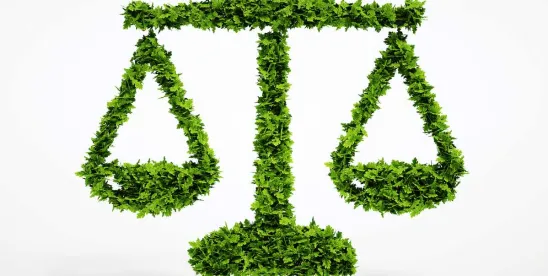As earlier reported, environmental non-governmental organizations (eNGOs) have promised to pursue enforcement where the Biden EPA left off – they have the legal authority to do so under most environmental federal statutes and a growing war chest to see those promises through. See B&D’s alert on how companies can prepare for a citizen suit. A jurisdictional element for an eNGO to bring a citizen suit is the Notice of Intent (NOI) to sue, usually 60 days. When the enforcement agency has “commenced and is diligently prosecuting a civil action” within or prior to expiration of the notice period, the citizen suit is barred.
Setting aside the practical and political aspects of commencing and diligently prosecuting the allegations of an NOI within 60 days, the diligent prosecution bar is tricky. The bar is effectuated differently across similar statutes, interpreted differently between jurisdictions, and applied differently to unique factual scenarios. Strategic use of the diligent prosecution bar should be contemplated early. Here are five considerations about the bar:
1. Know your non-compliance.
The diligent prosecution bar only applies to the same violations of the same regulatory standards alleged in the NOI. An EPA or state action involving different instances of the same or similar regulatory violations or involving different chemicals or constituents from those at issue in the citizen suit will not effectuate the diligent prosecution bar. See, e.g., Sanchez v. Esso Std. Oil Co., 572 F.3d 1, 9 (1st Cir. 2009) (government action bars “the violations they seek to enforce in common.”). Know your plant’s compliance vulnerabilities and whether eNGOs may be targeting a specific plant. A key strategy for eNGOs is to mine publicly available data and compliance reports (such as Clean Air Act (CAA) Title V deviations) as well as EPA and state agency enforcement records (inspection reports). Knowing what is in the public domain can help companies get ahead of potential NOIs and subsequent citizen suits.
2. Know your statute.
While many federal environmental laws contain citizen suit provisions with diligent prosecution bars, the wording varies across statutes. For example, in some cases—under laws like the CAA, the Toxic Substances Control Act, and the Endangered Species Act—the bar is only triggered if the government is prosecuting a civil or criminal case in a court of law. See 42 U.S.C. 7604(b)(1)(B); 42 U.S.C § 6972(b)(1)(B); 16 U.S.C. § 1540(g)((iii); 5 U.S.C. § 2619(b)(1)(B). In these instances, past administrative enforcement action will not suffice. In some states, like Texas, the vast majority of environmental enforcement is conducted administratively and rarely brought in state court. Even so, companies can point to administrative enforcement to help moot allegations of ongoing violations, a required element of a citizen suit claim. In contrast, under the Clean Water Act (CWA), administrative enforcement can, in some instances, suffice to bar a citizen action. 33 U.S.C. § 1319(g)(6)(A) (but see below on circuit splits). Finally, the unusual scope of the Resource Conservation and Recovery Act’s “imminent and substantial endangerment” claim for citizen suits opens the door to a broad range of past and current plant activities that may give rise to an endangerment and is not dependent on regulatory infractions.
3. Know your jurisdiction.
Courts of appeals take different views on multiple aspects of the citizen suit provisions, particularly in the context of the CWA—the most common statute under which eNGOs file citizen suits. For example, exactly which administrative actions serve to bar citizen suits remains an open question. In 2023, the U.S. Supreme Court declined to review a petition challenging a Fourth Circuit ruling that found that a citizen suit could move forward despite state administrative enforcement action, because the administrative agreement did not provide “meaningful public participation.” See Natural and Trust v. Dakota Finance LLC, 41 F.4th 342 (4th Cir. 2022). The Eighth Circuit found differently, holding that a state action had “commenced” at the time the State filed a consent administrative order, and explaining that once the order was issued, “interested third parties had a right to intervene, and certain notice and hearing procedures became available to interested third parties.” Arkansas Wildlife Fed’n. v. ICI Americas, Inc., 29 F.3d 376, 380 (8th Cir. 1994). By declining review, the Court left this split open. A similar split remains on whether CWA citizen suits rulings can enforce permit terms under only state law as discussed in an earlier alert.
4. Know your relief.
The First and Tenth Circuit Courts of Appeals have held that prior administrative actions assessing penalties under the CWA will only bar penalties sought in a citizen suit – not injunctive relief. See Blackstone Headwaters Coalition, Inc. v. Gallo Builders, Inc., et al., 32 F.4th 99 (1st Cir. 2022); Paper, Allied-Indus., Chem. & Energy Workers Int'l Union v. Cont’l Carbon Co., 428 F.3d 1285, 1300 (10th Cir. 2005). This distinction in relief sought is important because the injunctive relief a citizen suit seeks can be far more onerous than the civil penalties. Where a plant could be vulnerable to allegations of continuous violations of the same regulatory standards and that a court could view as likely to recur, consider developing more systemic corrective actions to cure that non-compliance and to counter the purported need for any additional injunctive relief an eNGO may demand.
5. Know your regulator.
A key aspect of the NOI is to provide time for an enforcement agency to bring its own suit, thereby eliminating the need for citizen action. If the enforcement agency has not commenced prosecution, a company should consider inviting the state to enforce the violations in lieu of the citizen suit. But the state must file the diligent prosecution suit within 60 days. Some states may not have the political proclivity or bandwidth to meet such a tight turnaround, especially if the NOI alleges scores deviations or violations. That said, even if a company cannot completely avoid a citizen suit , it can use agency intervention, similar to compliance efforts, later to support mootness arguments. Good relationships with regulators are always advisable, but in this instance in particular, could have a critical impact on the scope of a citizen suit and its ultimate resolution.
Navigating the diligent prosecution bar can be challenging and understanding its nuances early can be a game-changer. Whether shielding against litigation or managing its scope moving forward, a well-informed strategy is key.






 />i
/>i
